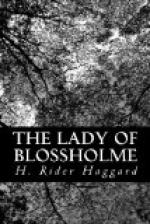He shook his head.
“A devil does not die in fire. He is away somewhere, to plot fresh murders—perhaps our own and our boy’s. Oh!” he added savagely, “till my hands are about his throat and my dagger is in his heart there’s no peace for me, who have a score to pay and you both to guard.”
Cicely knew not what to answer; indeed, when this mood was on him it was hard to reason with Christopher, who had suffered so fearfully, and, like herself, been saved but by a miracle or the mandate of Heaven.
Of a sudden a hush fell upon the place. The blackbirds ceased their winter chatter in the laurels; it grew so still that they heard a dead leaf drop to the ground. The night was at hand. One last red ray from the set sun struck across the frosty sky and was reflected to the earth. In the light of that ray Christopher’s trained eyes caught the gleam of something white that moved in the shadow of the beech tree where they sat. Like a tiger he sprang at it, and the next moment haled out a man.
“Look,” he said, twisting the head of his captive so that the glow fell on it. “Look; I have the snake. Ah! Wife, you saw nothing, but I saw him, and here he is at last—at last!”
“The Abbot!” gasped Cicely.
The Abbot it was indeed, but oh! how changed. His plump, olive-coloured countenance had shrunk to that of a skeleton still covered by yellow skin, in which the dark eyes rolled bloodshot and unnaturally large. His tonsure and jaws showed a growth of stubbly grey hair, his frame had become weak and small, his soft and delicate hands resembled those of a woman dead of some wasting disease, and, like his garments, were clogged with dirt. The mail shirt he wore hung loose upon him; one of his shoes was gone, and the toes peeped through his stockinged foot. He was but a living misery.
“Deliver your arms,” growled Christopher, shaking him as a terrier shakes a rat, “or you die. Do you yield? Answer!”
“How can he,” broke in Cicely, “when you have him by the throat?”
Christopher loosed his grip of the man’s windpipe, and instead seized his wrists, whereon the Abbot drew a great breath, for he was almost choked, and fell to his knees, in weakness, not in supplication.
“I came to you for mercy,” he said presently, “but, having overheard your talk, know that I can hope for none. Indeed, why should I, who showed none, and whose great cause seems dead, that cause for which I fought and lived? Let me die with it. I ask no more. Still, you are a gentleman, and therefore I beg a favour of you. Do not hand me over to be drawn, hanged and quartered by your brute-king. Kill me now. You can say that I attacked you, and that you did it in self-defence. I have no arms, but you may set a dagger in my hand.”
Christopher looked down at the poor creature huddled at his feet and laughed.
“Who would believe me?” he asked; “though, indeed, who would question, seeing that your life is forfeit to me or any who can take it? Yet that is a matter of which the King’s Justices shall judge.”




